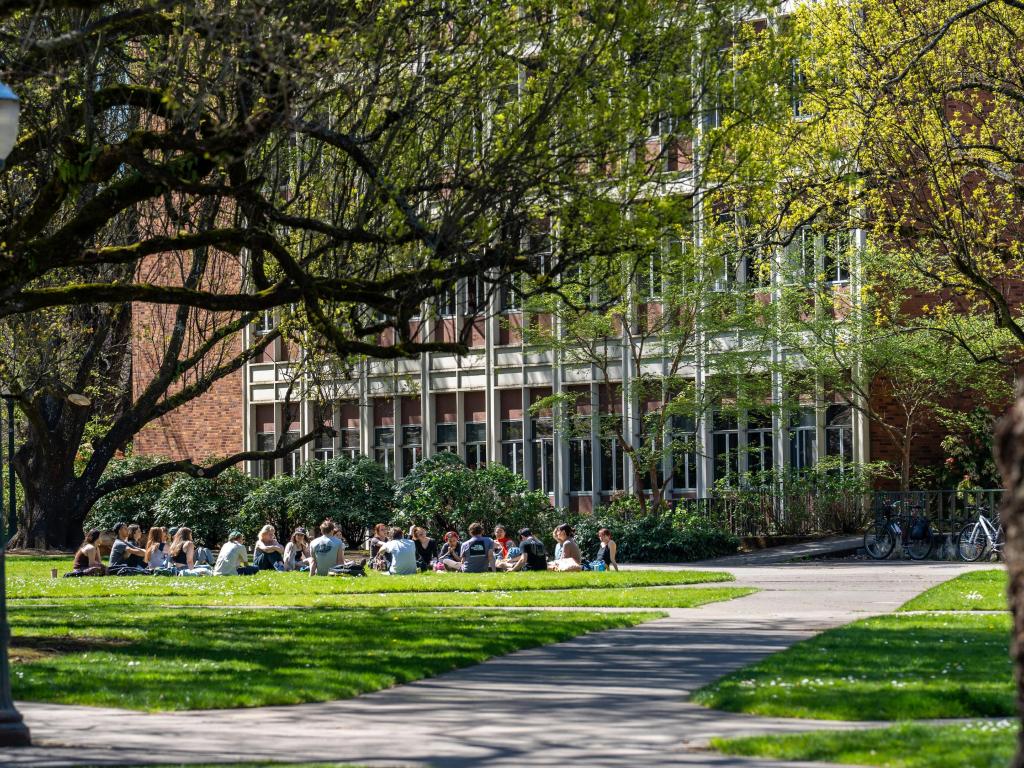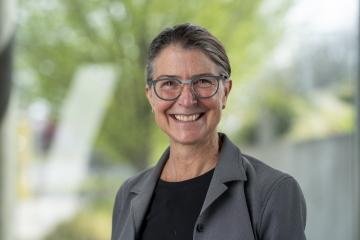
The Office of the Vice President for Research and Innovation (OVPRI) and the Oregon Humanities Center (OHC) announce that Leah Middlebrook has been appointed as the new director of the OHC. Current OHC director, Paul Peppis, will retire June 30, 2024. Leah will take the helm on July 1.
“Leah has a rich history of service to the university, strength as a leader as department head of Comparative Literature, and active participation in the humanities community of scholarship,” said Anshuman “AR” Razdan, vice president for research and innovation. “Paul Peppis’s long stewardship of the Oregon Humanities Center leaves big shoes to fill, but I am confident in Leah’s ability to take the Center to new heights.”

Leah Middlebrook is an associate professor of Comparative Literature and Spanish. She received her doctorate in Comparative Literature in 1998 from the University of California, Berkeley, where she specialized in 16th century Spanish, French, and English lyric poetry. She spent 1994–1995 in Madrid as a Fulbright Scholar. From 1998–2000 she was an Andrew W. Mellon Postdoctoral Fellow in the Humanities in the Department of Comparative Literature at Stanford University, where she continued as a lecturer 2000–2001, before joining Comparative Literature and Romance Languages at the University of Oregon in 2002.
Middlebrook’s research and teaching interests include the lyric, poetry and poetics, early modern translation, theories of the subject, and critical constructions of Western modernity, particularly as those constructions shape our ideas about the “early” modern. She has published essays on early modern poetry and poetics, on Cervantes, and on comparative issues in seventeenth-century Spanish and French theater. Her books include Imperial Lyric: New Poetry and New Subjects in Early Modern Spain (Pennsylvania State University Press, 2009) and Poiesis and Modernity in the Old and New Worlds, co-edited with Anthony J. Cascardi (Vanderbilt University Press, 2012).
Amphion: Lyre, Poetry, and Politics in Modernity is forthcoming from the University of Chicago Press in 2024. Her current book project sets Velázquez's 1656 painting Las Meninas at the center of an extended consideration of gender and woman-ness as tropes of early, high, and late modernity; a second project situates Ovid's Metamorphoses in extra-European contexts.
Middlebrook received the Herman Award for Distinguished Teaching at the University of Oregon in 2016. She received the Ersted Award for Distinguished Teaching at the junior faculty level in 2007.
She served as department head for Comparative Literature (2018–2021) and on the College of Arts and Sciences Deans Advisory Committee (2011–2013) and Faculty Personnel Committee (2016–2018). Middlebrook served as president for the Society for Renaissance and Baroque Hispanic Poetry (2018–22). She has also served on boards, panels, and executive committees for the Modern Languages Association (2018–23), the Society for Renaissance and Baroque Hispanic Poetry (2004–08), and Renaissance Quarterly (2019–24).
“The Oregon Humanities Center is a vibrant source of intellectual inspiration, and it provides indispensable support for the broad-ranging humanistic inquiry carried out by faculty, graduate students, and undergraduate students at the University of Oregon,” said Middlebrook. “The center also plays an important role as a hub of intersection between the university and our wider communities and publics, both in Eugene and throughout Oregon. I am delighted beyond words to have been appointed to the directorship. It’s an honor I take seriously, and I look forward to getting to know our community, the center’s many constituents and stakeholders: researchers, friends, staff, and publics, in the coming months.”
— By Peg Gearhart, Oregon Humanities Center
